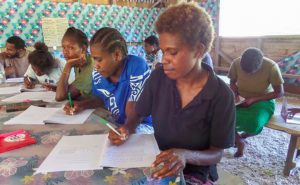In the realm of moral education, the Bahá’í Faith underscores an imperative: fostering a collective consciousness that transcends individualism. In Vanuatu, an archipelago imbued with rich cultural diversity, the Bahá’í community seeks to construct a shared vision rooted in moral values. This vision is essential for unifying disparate groups and cultivating a society where ethical considerations are paramount. By doing so, the Bahá’í teachings illuminate pathways towards collaborative growth, social cohesion, and holistic development.
The ethos of moral education, as delineated within Bahá’í writings, serves as a cornerstone for community building. Moral education is not confined to traditional academic paradigms but extends into the moral fiber of everyday life. In this regard, it encapsulates the nurturing of virtues such as honesty, compassion, and justice, which are imperative for the establishment of a well-rounded individual and, by extension, a harmonious society. The Bahá’í perspective insists upon the integration of ethical principles with practical learning. This integration is indispensable in Vanuatu, where the need for a unified moral framework is pronounced amidst the challenges of modernization and globalization.
A critical aspect of moral education in Vanuatu is the engagement of youth. Young people represent the future, and their moral development is crucial for the sustainability of societal values. The Bahá’í community facilitates programs that engage youth in discussions centered around virtue and responsibility. Such initiatives are not merely academic exercises; they are designed to empower youth to articulate their thoughts and feelings in a constructive manner. By instilling a sense of accountability and encouraging ethical reasoning, these programs prepare youth to navigate the complexities of modern life while remaining anchored to their cultural heritage.
Moreover, the Bahá’í teachings advocate for an inclusive approach to moral education. In Vanuatu, where various ethnicities coexist, the need for a pedagogy that respects and celebrates cultural diversity is paramount. The Bahá’í principle of unity in diversity fosters an environment where different cultural narratives can coalesce into a shared moral vision. This multicultural engagement is vital, as it promotes understanding and diminishes prejudices that may arise from ethnic distinctions. Through workshops and community dialogues, the Bahá’í community encourages participants to share their cultural stories, thereby enriching the moral curriculum and rooting it in local contexts.
The multifaceted role of educators in this process cannot be overstated. In the Vanuatu context, Bahá’í-inspired teaching methodologies emphasize the teacher’s role as a facilitator of learning rather than merely a provider of information. Teachers are encouraged to create spaces where learners can explore moral dilemmas, engage in critical thinking, and develop their own ethical frameworks. This pedagogical approach fosters a deeper understanding of moral concepts as students relate them to their personal experiences within their communities. By empowering educators, the Bahá’í community prioritizes the establishment of a robust moral foundation that resonates with the lived realities of students.
Another vital component of this moral education initiative is the incorporation of community service projects. The Bahá’í Faith posits that service to humanity is a key expression of moral development. In Vanuatu, community service initiatives are not only about giving back; they are deeply intertwined with character building and ethical conduct. Participating in service projects cultivates empathy and a sense of belonging, encouraging individuals to understand their impact on others. As communities collaborate on projects, a sense of solidarity emerges, further solidifying the collective vision for a just and moral society.
Furthermore, the evaluation of moral education programs is an integral element of their efficacy. Assessments should not solely focus on academic performance but also consider the ethical growth of participants. By employing a holistic evaluation framework, the Bahá’í community can gauge the internalization of moral values and identify areas for improvement. Measuring success in moral education transcends conventional metrics, calling for a focus on qualitative outcomes that reflect the broader aspirations of the community.
The critical journey towards building a common vision through moral education requires unwavering commitment, innovative strategies, and collaborative efforts. Local leaders and community members play a pivotal role in championing this vision and ensuring its sustainability. The cross-pollination of ideas within local communities, coupled with the universal principles of the Bahá’í Faith, can engender transformative change. As Vanuatu continues to navigate the challenges posed by sociocultural dynamics and globalization, the establishment of a common moral framework will be paramount in fostering resilience and unity.
In conclusion, the Bahá’í teachings offer profound insights into the role of moral education as a means of constructing a shared vision in Vanuatu. Through harnessing the potential of youth, honoring cultural diversity, empowering educators, promoting community service, and implementing comprehensive evaluations, the Bahá’í community provides a template for ethical progress. The moral education initiatives fostered within Vanuatu stand not only as efforts to uplift local society but as a testament to the capacity of collective moral striving to create a more just and peaceful world.
